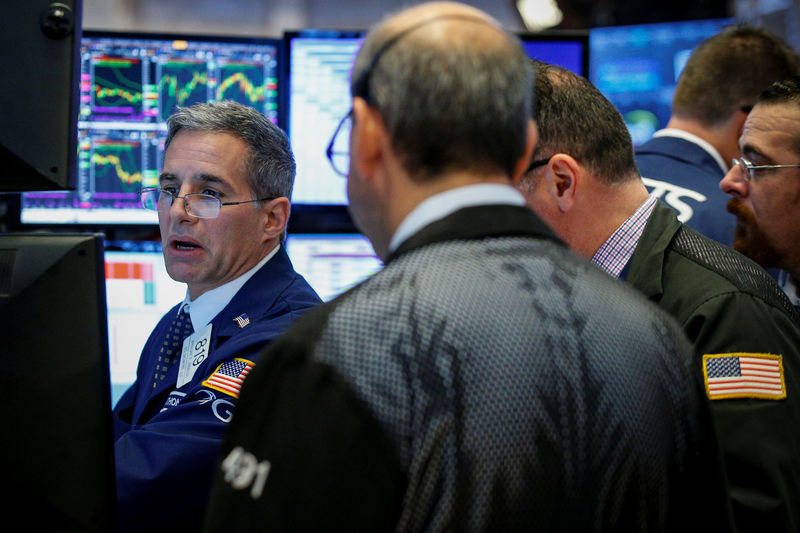By Kit Rees and Caroline Valetkevitch
LONDON (Reuters) - European and U.S. firms are reaping the benefits of a global economic expansion that is finally blooming into meaningful earnings growth and looks set to extend an equity boom through the current quarter.
While the third quarter of each year is typically viewed as the weakest for firms, this time both markets are enjoying robust earnings growth, surpassing analysts' already-high expectations.
That is despite hurricanes lashing the United States and fears the euro's 10.6 percent jump against the dollar would hit European exporters' profits.
Europe in fact is witnessing a stand-out year.
With more than two-thirds of the reporting season over, 65 percent of MSCI Europe firms have met or beaten expectations, according to Thomson Reuters I/B/E/S data, which shows year-on-year earnings growth at 9.8 percent in dollar terms.
The equivalent STOXX 600 (STOXX) figure is 9.7 percent.
For companies in the MSCI Europe index <.dMIEU00000PUS>, estimates are clocking in at 12.4 percent, set to outpace U.S. earnings - as measured by the 9.8 percent growth on MSCI's U.S. benchmark -- for the first time since 2003, according to research by Thomson Reuters.
"I think people probably slightly underestimated the economic momentum that was going to be coming through from the euro zone, and slightly overestimated the drag that the stronger euro would have on the earnings," Caroline Simmons, deputy head UK investment office at UBS Wealth Management, said.
So how has the picture changed?
Firstly, political roadbumps including national elections in France and Germany earlier this year, have been successfully overcome. Secondly and more importantly, the European and global economies have both gained steam.
"Global growth ... tends to be the main driver of European earnings," Sebastian Raedler, head of European equity strategy at Deutsche Bank (DE:DBKGn), said. "It is (also) very clear that you have extremely strong growth momentum in Europe."
World growth was raised by the International Monetary Fund to 3.6 percent for this year, while the euro zone is seen expanding 2.1 percent, reflecting an export revival as well as stronger domestic demand.
The euro area economy grew 0.6 percent in the July-September period from the previous three months - 2.5 percent higher than in the same period of 2016..
"The very robust macro data we had through the third quarter was expected to provide some support, and it looks like it has done," Matthew Garman, equity strategist at Morgan Stanley (NYSE:MS), said.
On the European earnings front, tech stocks, financials and consumer staples have seen the highest percentage of beats so far.
With the pan-European STOXX index (STOXX) up 8.5 percent this year, the region is luring more investors. Its fund industry has seen assets under management grow by almost a tenth to just over 10 trillion euros, Thomson Reuters fund research firm Lipper says.
Overseas investors have also spotted relative value in Europe's market, with MSCI Europe shares trading around 15 times forward earnings compared to over 18 times for MSCI's U.S. index.
"We still think Europe looks attractive," Russ Koesterich, a manager of the $39 billion BlackRock Global Allocation Fund (O:MALOX), said.
"European profit margins have further to expand ... And by and large, European companies are cheaper than U.S. companies."
MSCI Europe Earnings Estimates - http://reut.rs/2zoMBvd
WALL STREET TECH BOOM
The picture is similarly robust in U.S. markets. With results in from around 80 percent of the S&P 500 companies, year-over-year profit growth is estimated at nearly 8 percent as results have come in stronger then expected.
The S&P 500 (SPX) has hit a series of record highs in recent weeks, gaining nearly 16 percent this year. But the earnings growth is the slowest since the 2016 fourth quarter and below the double-digit gains seen in the first two quarters of the year, according to Thomson Reuters data. Comparisons were tougher because U.S. earnings reversed a year-long profit decline in the third quarter a year ago.
But the dollar, which had its weakest showing since 2014 in the third quarter, has helped bolster companies, along with stronger global economic growth.
"The companies that have more international business have been doing particularly well over the earnings season," said Eric Kuby, chief investment officer at North Star Investment Management Corp in Chicago.
A stellar set of results for tech giants have been a highlight, and the sector's earnings are seen up 22.8 percent from a year ago, rising beyond a projection of 12.2 percent from the beginning of October following upbeat results from heavyweights including Apple (O:AAPL).
Overall, the S&P technology (SPLRCT) index has gained 38 percent this year, while Europe's tech index (SX8P) has jumped around 24 percent.
"Strength is being driven by secular themes among cloud computing, software-as-a-service, and Internet companies," Jonathan Golub, chief U.S. equity strategist at Credit Suisse (SIX:CSGN) Securities told clients.
"Beats have been quite abundant, particularly on the top line. As a result, the sector has seen among strongest positive price performance," Golub added. Amazon (O:AMZN), Alphabet (O:GOOGL), Caterpillar (N:CAT) and 3M (N:MMM) have also had strong results.
But there are concerns about earnings sustainability.
"Is this a little interruption and will we then get a return to double-digit earnings growth later on? We don't think so,” Deutsche Bank's Raedler said, in reference to Europe.
David Kotok, chief investment officer of Cumberland Advisors, Florida, said he saw limits to growth rates in U.S. tech companies and had recently reduced his weighting in FANG stocks - Facebook (NASDAQ:FB), Apple, Netflix (NASDAQ:NFLX) and Google's listed vehicle Alphabet.
Apple's market capitalization, approaching $1 trillion, "pushes the limits of how much out of the global GDP can one company obtain," Kotok said. "Growth rates, because of size, slow, by definition."

Earnings growth S&P 500 vs STOXX 600 - http://reut.rs/2zJviWr